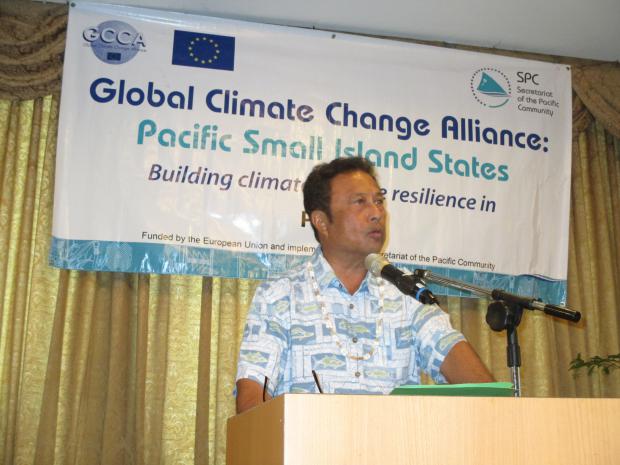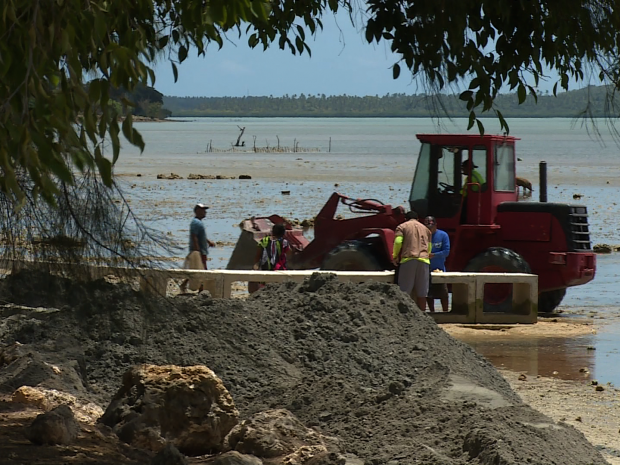GCCA Pacific Small Island stories featured at the Pacific Climate Change Roundtable
Discussion details
At the Pacific Climate Change Roundtable (PCCR), held in Samoa 12-14 May 2015, 190 climate change practitioners mainly from the Pacific region and also from the international arena, met to review the delivery of the Pacific Islands Framework for Action (PIFACC) over the period 2006 – 2015.
Particularly over the last three years, the European Union (EU) funded Global Climate Change Alliance: Pacific Small Island States (GCCA: PSIS) project, implemented by the Secretariat of the Pacific Community (SPC), has been working with nine Pacific Island countries to help tackle the adverse effects of climate change. The project is promoting long term strategies and approaches to adaptation planning and paving the way for more effective and coordinated aid delivery on climate change at the national and regional level.
Several of the GCCA: PSIS project activities were highlighted at last week’s PCCR as they contribute to the PIFACC vision: “Pacific Island people, their livelihoods and their environment are resilient to the risks and impacts of climate change.”
On long term strategies and approaches

The President of Palau, His Excellency Tommy Remengesau Jr. addressing the participants at the National Climate Change Consultative Workshop in Palau, March 2015
Reporting on Palau’s long term strategy for climate change, Xavier Matsutaro, Climate Change Officer, Office of Environmental Response and Coordination, Palau, emphasized the importance of combining political support and widespread community consultation in the development of the Palau Climate Change Policy and Action Plan for Climate and Disaster Resilient Low Emission Development.
“While coordination of the different groups was a challenge, our President lent his voice of support to the process at every major consultation, and the facilitation made possible by our development partners (SPC, EU and GIZ) has made for clear policy direction that is already helping us implement more integrated actions.
This also advances our work to fulfill our obligations to the United Nations Framework Convention on Climate Change to develop adaptation and mitigation action plans and intended nationally determined contributions.”

Coastal protection works under construction in Tonga, February 2015
Lu'isa Tu'I'afitu Malolo, Director of Climate Change in Tonga's Ministry of Meteorology, Energy, Information, Disaster Management, Environment and Climate Change presented the result of her ministry's trialling of hard and soft coastal engineering measures designed to benefit 4,000 people living on the east coast of Tongatapu.
“Proper community engagement and planning from the very beginning was important. Explaining climate change science and the reasoning behind the project was key to community understanding and engagement.
We are replicating the approach, which includes feasibility studies, environmental impact assessment and engineering design on the island’s western coastline” Malolo said.
On paving the way for more effective and coordinated aid delivery on climate change
Presentations from the Cook Islands and Tonga illustrated how the GCCA: PSIS project is helping countries prepare themselves for new sources of climate change finance. Lavinia Tama, Cook Islands Ministry of Finance and Economic Management, described the detailed process her country has embarked on to become a National Implementing Entity to the Adaptation Fund and showed how this has helped them improve their procurement process and anti-corruption measures.
On the same theme Sione Fulavi, Senior Climate Finance Analyst, Climate Change Division, told the PCCR about Tonga’s ongoing work to establish a National Climate Change Fund which it is envisaged to serve as a central pool of climate change finance to support the Government of Tonga to achieve its climate change and disaster risk management goals and priorities.
Moving to project proposal preparation, William Tuivaga, Climate Change Cook Islands, described a series of trainings supported by SPC, EU and UNDP, to build national capacity in proposal preparation using the logical framework approach (LFA).
“Not only did the training, which involved 30 Cook Islanders, help us meet good project design requirements with over 38 projects now happening, but also helped us build confidence in working with outer island communities to enable them to do participatory strategic planning and prioritization based on root causes and solutions, rather than unrealistic expectations of assistance based on wish lists.”
Running through all these presentations was the theme of partnerships which was emphasized by Josie Temate, Director General, Ministry of Natural Resources, Niue. She described how Niue had secured funding from EU, UNDP and Australia to build a partnership to construct a tank manufacturing facility in Niue and supply all the households with rainwater catchment systems.
“Flexibility so that we can cater for the unexpected is critical for successful project delivery and partnerships” Temate said.
For more information on GCCA: PSIS go to
Log in with your EU Login account to post or comment on the platform.